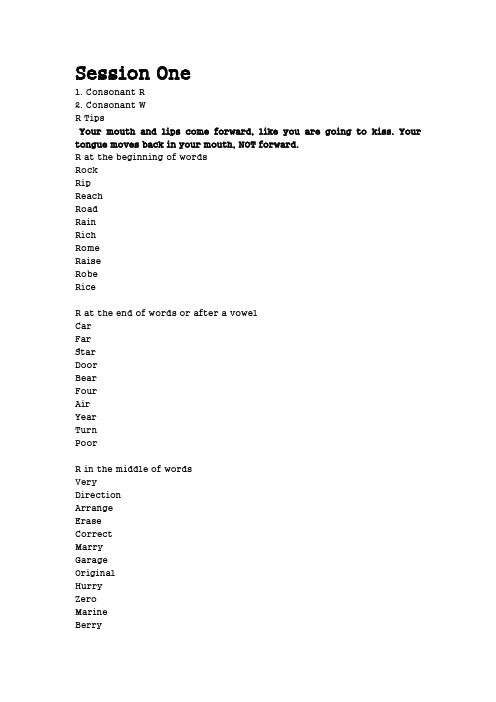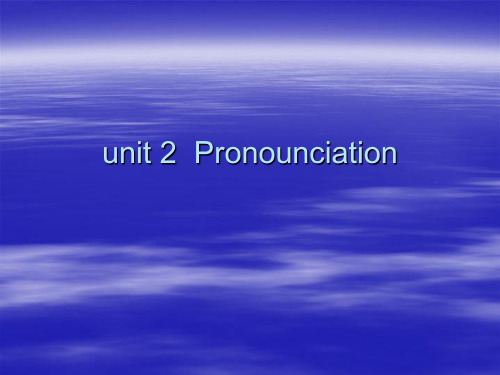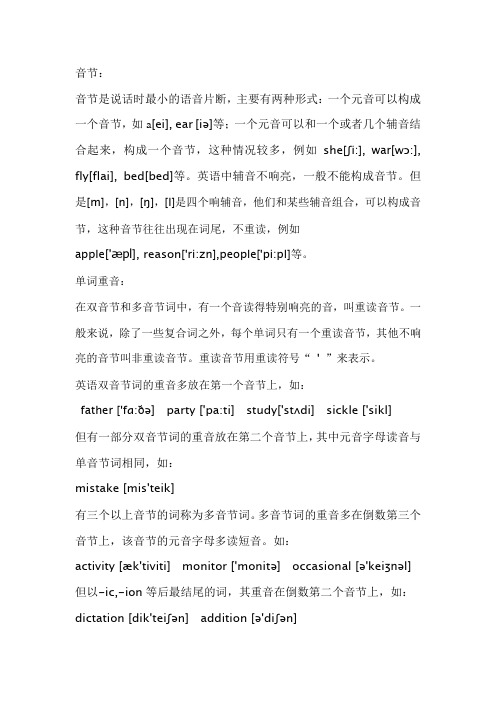about pronounciation
- 格式:doc
- 大小:73.50 KB
- 文档页数:18



pronunciation相关的词汇Pronunciation (发音) 是学习一门语言时非常重要的一部分。
一个正确的发音可以帮助我们更好地理解和被别人理解。
在这篇文章中,我将详细介绍与发音相关的词汇,并探讨一些发音技巧和注意事项。
我们来讨论一些与发音相关的基本概念。
音素(phoneme) 是指语言中的最小音位单位,它可以改变一个词的意义。
而音标(phonetic symbol) 则是用来表示音素的符号,它帮助我们准确地发出每个音素的发音。
例如,英语中的音标可以帮助我们区分/p/ 和 /b/ 这两个不同的音素。
接下来,让我们谈谈一些常见的发音问题。
第一个问题是连音(liaison)。
连音是指在一个词的末尾以辅音结尾,而下一个词的开头以元音开头时,两个词之间的辅音会被连读。
这种连音可以使语言更加流畅,例如在英语中,"an apple" 会连读成 "anapple"。
第二个问题是重音 (stress)。
重音是指在一个词中,某个音节的发音要比其他音节更强烈。
正确的重音可以帮助我们更好地表达意思,而错误的重音可能导致理解上的困惑。
在英语中,重音通常出现在名词、动词和形容词的第一个音节上。
除了连音和重音,还有一些其他的发音技巧和注意事项。
一个重要的技巧是舌位的控制。
不同的语言中,舌位的位置可能有所不同,这会影响到发音的准确性。
另一个技巧是喉音的使用。
有些语言中有喉音的发音,例如英语中的/h/ 音,而有些语言中则没有。
正确地使用喉音可以使我们的发音更加自然。
发音的速度和节奏也是需要注意的。
太快或太慢的发音都可能导致交流上的问题。
一个合理的发音速度和节奏可以使我们的语言更加有韵律感,更容易被别人理解。
我想提到一些发音的练习方法。
首先,多听多模仿。
通过听母语人士的发音并模仿他们,我们可以更好地学习和掌握正确的发音。
其次,使用录音设备。
将自己的发音录下来并进行对比,可以帮助我们发现并改正发音中的问题。

用英语介绍重阳节的起源和习俗Double Ninth Festival重阳节关于时间The 9th day of the 9th lunar month is the traditional Chongyang Festival, or Double Ninth Festival, is also called 'Cornel Festival' and 'Chrysanthemum Festival', which has a history of more than 1,700 years. It usually falls in October in the Gregorian calendar.农历的九月初九是重阳节,又名“茱萸节”,“菊花节”。
这是一个很古老的节日,距今已有1700多年的历史。
通常在公历(阳历)的十月份。
关于命名In an ancient and mysterious book Yi Jing (The Book of Changes), number '6' was thought to be of Yin character, meaning feminine or negative, while number '9' was thought to be Yang, meaning masculine or positive. So the number nine in both month and day creates 'the Double Ninth Festival', or 'Chongyang Festival'.因为古老的《易经》中把“六”定为阴数,把“九”定为阳数,在农历的九月初九那天,日月并阳,两九相重,故而叫“重阳”,也叫“重九”。
关于意义In 1989, the Chinese government decided the Double Ninth Festival as Seniors' Day. The traditional culture of Double Ninth and that of the modern were finely combined. It becomes a festival of respecting for the old people, and loving, helping the old.在1989年,我国把每年的农历的九月初九定为老人节。

音节:音节是说话时最小的语音片断,主要有两种形式:一个元音可以构成一个音节,如a[ei], ear[iə]等;一个元音可以和一个或者几个辅音结合起来,构成一个音节,这种情况较多,例如she[ʃi:], war[wɔ:], fly[flai], bed[bed]等。
英语中辅音不响亮,一般不能构成音节。
但是[m],[n],[ŋ],[l]是四个响辅音,他们和某些辅音组合,可以构成音节,这种音节往往出现在词尾,不重读,例如apple['æpl], reason['ri:zn],people['pi:pl]等。
单词重音:在双音节和多音节词中,有一个音读得特别响亮的音,叫重读音节。
一般来说,除了一些复合词之外,每个单词只有一个重读音节,其他不响亮的音节叫非重读音节。
重读音节用重读符号“' ”来表示。
英语双音节词的重音多放在第一个音节上,如:father ['fɑ:ðə] party ['pa:ti] study['stʌdi] sickle ['sikl]但有一部分双音节词的重音放在第二个音节上,其中元音字母读音与单音节词相同,如:mistake [mis'teik]有三个以上音节的词称为多音节词。
多音节词的重音多在倒数第三个音节上,该音节的元音字母多读短音。
如:activity [æk'tiviti] monitor ['monitə] occasional [ə'keiʒnəl] 但以-ic,-ion等后最结尾的词,其重音在倒数第二个音节上,如:dictation [dik'teiʃən] addition [ə'diʃən]失去爆破:辅音[p], [b], [t], [d], [k], [g]是爆破音。
两个爆破音在一起时,第一个爆破音不发生爆破,只是有关发音器官做好这个音的发音姿势,稍停随即发后面的爆破音。

2020年高考英语作文范文汇总及解析全国卷一你身边值得尊敬的人+理由学校举行作文比赛以你身边敬爱或爱戴的人为题,写一篇短文参赛。
内容包括:1、受到敬爱、爱戴的人的简介;2、说明理由。
注意:1、词数100左右;2、可以适当增加细节,以使行文连贯;3、结束语已为你写好。
写作指导:审题注意点:1.最好写自己身边尊敬或爱戴的人,名人,抗疫英雄应该不算身边的人吧?2.简介最好包括外貌,职业等基本情况,但要简明扼要,不宜拓展太多,毕竟要点2才是重点。
3. 充分拓展尊敬的理由,要点2是文章的body。
有理有据,使人信服。
4.文章标题和第一句话已经给出,注意衔接和紧扣标题。
The people I respectThereare many people respectable around us. The people I respect most is my aunt, acharming woman of medium built, who was born into a rich family and received a good education. Now she is an excellent doctor and specializes in internalmedicine.As we all know, COVID-19 broke out in March of this year in Wuhan city, which was in urgent need of doctors and nurses.Every one across our country was so frightened at the epidemic that nearly none dared to go to Wuhan city. However, at this crucial moment, it was my aunt that risked her life to do voluntary work without hesitation, which amazed me so much. I show great respect for her not only because of her courage but also due to her selfless contribution to our homeland. Besides, she doesn't care about money as well as fame but cares for others. Her life attitude also makes a great difference on me.All in all, my aunt sets a good example for me. And I do learn a lot from her. That's the reason why I respect her most.全国卷二上周末,你和同学参加了一次采摘活动。
Unit 1 How can we become good learners?一.What about reading aloud to practice pronunciation?pronounciation [cn]/[un] 发音His pronounciation is really good after his hard working. 他努力学习之后,发音真的很棒了。
This word has two different pronounciations. 这个单词有两种发音。
二.Well, be patient.patient n. 病人The patient has a bad temper. 这个病人脾气很坏。
patient adj. 耐心的be patient with sb. “对某人有耐心”You should be patient with your little sister. 你应该对你的妹妹有耐心。
patience n. 耐心patiently adv. 耐心地impatient adj. 没有耐心地polite---impolite moral(道德的)---immoral polite----impolite三.The more you read, the faster you’ll be.“the + 比较级,the + 比较级”,意思是”越...越...”The more we get together, the happier we’ll be. 我们相聚得越多,我们就会越开心。
The more careful you are, the few mistakes you will make. 你越细心,你出错就会越少。
四.The teacher spoke so quickly that I did not understand her most of the time.含结果状语从句的复合句,so...that...表示”如此...以至于...”,so接形容词或副词。
1. words:1) be me see we he she eat neat beat deed Peel meal free tree three clean grief please breeze.2) even reason teacher feature feeble people indeed succeed receive belief immediate convenient.2. phrases:a team leader / a League meeting / the Chinese people / the East Sea Fleet / a real secret / a piece of lean meat /3. sentences: 'Read it, please. / Keep it a secret./ Please speak English./ Extremes meet / Eve is Peter's niece./ Peter reads to Jean every evening. / We eat meat, peas, beans and cheese for meals./ Do you see the green leaves of each tree in the field?/4. a short poemSee the breeze teasing the tree, Weaving the leaves or shaking them free,Tossing the fleece of sheep, that keep on peacefully feeding, half asleep.21. words:1) it sit bit fit big pig kick pick give live kiss miss ill fill sink think rich which fish wish2) city pretty busy visit limit minute willing filling begin belong delay desire remain return select secure prefer present elect event explain extreme exit exchange3) /iz/ horses races prices causes wishes- pages judges babies armies journeys monkeys4) /id/ parted waited needed guided carried worried5) /ist/ forest earnest honest longest shortest6) /i -- i:/ sin.— seen / fill— feel / hill —heel / sick— seek / pitch— peach / lick — leak / rid— read / itch — each / slip — sleep / pip —peep / grin — green / chick — cheek/2. phrases: -a big clinic / a big dictionary / a bit chilly / a bit dizzy / fix it / finish it / finish it quickly / give him six / bit by bit / little by little / pretty busy / sixty women / finish the biscuit3. sentences:1) It's hit or miss. / Finish it, it isn't difficult. / This isn't an interesting system. / The Missouri River is a tributary of the Misssissippi. / Tim's as thin as a pin./ Sister Lily is sitting there knitting in silence. /2) /i — i:/: Please sit in this seat. / These shoes should fit your feet./ Those bins are for peas and beans4. short poems: 1) Silly BillySilly Billy! Silly Billy! Why is Billy silly? Silly Billy hid a shilling. Isn’t Billy silly!2) The Fish in the RiverThe fish in the river swiftly swim And slip through the weeds with a silver gleamTill they flick their fins and rise with a swish to nibble the midges that skim the stream.1. words:1) get debt yet wet neck check bed dead egg beg pen ten tell fell best test next text spend friend2) any many very ever never seven heaven metal gentle yellow fellow action question3) attend accept forget correct collect connect4)/e — i/: pet — pit / fell — fill / set — sit / when — win / hell — hill / dead — did /tent — tint / peg — pig / lest — list / left — lift/2. phrases:very well / get ready / ten desks / twenty cents / the next sentence / red and expert /my best friend / a television set / wet with sweat / terrible weather/ press the bell / a red head-dress / fresh and energetic /3. sentences: '1) Well, let's get everything ready. / Better late than never. / Every little helps. / Ben is wet with sweat. / Ted looks fresh and energetic. / Remember to get me ten eggs. / Ketty has put on her red dress again. / Let the ten guests have a rest first. / Alt is well that ends well./Better to do well than to say well. / East and west, home is best. / He fed little Teddy with fresh eggs and bread./2)/e — i/: He hid his heed. / He slid on the sled. / Please check the chick. / Fasten duepig to this peg. / A sore wrist needs rest.4. short poems1) Steady, Neddy, steady, ready to be fed! Steady, Neddy, steady, ready for your bed.2) To tell that Ted is well, that Ben and Bess are better, And that Ned says he is best of all,let's send a special letter.41. words:1) cap map fat hat bad mad back lack gas mass catch match man ran hand land bank thank lamp stamp act fact2) carry marry happy fancy carriage manage matter latter pattern gather Handle battle absent anxious3) family Saturday national capital annual satisfy character avenue salarynatural practical average4) /ae — e/: bag — beg / gas —guess / mat — met / sad — said / bad — bed / land —lend / sand — send / pack — peck / tan — ten / ham — hem / pan — pen / lad — led/5) /ae — ai /: sad — side / back —bike /lack — like / mat — might / bat — bite / land — lined / pack — pike /hat — height / lad — lied/ pan — pine /2. sentences:1) A fact is a fact. / Hang your cap on the stand./ Fancy that! / Catch that mad black cat. /Thank you for the stamp. / Hand me the hammer. / Don't let the cat out of the bag. / Handsome is as handsome does. / The man ran back to gather his black hat and black bag. 2) /ae — e/: This bed is bad: / This is a bad pen. / I guess they want gas. / Can you bend that iron band? / what daddy said made me sad./3. short poems1) Chatter, chatter, What a clatter! Clap your hands, It doesn't matter.2) To Acton and backOn their narrow track the trains clang and rattle and bang, and with angry cracklesthey sometimes scatter, electric sparks above the clatter.5Words:1)arm art hard fast last glance chance aunt class glass harsh march2)army party after father rather castle parcel market basket gardenpardon carpet drama3)regard demand command depart advance remark mamma papaphrases:a large parcel / a basket of grass / pass the glass / half past one / after the party / can’tdance / rather fast / hard-hearted / master of art / tomatoes and bananassentences:The party stopped at half past five. / The partisan fastened the parcel to the basket. / Alarge army marched past the farm yard. / He laughs best who laughs last. / She glanced at the her father. Farmer Barnes is a hard man for a bargain, but he isn’t hard-hearted.A poem:Past barges and carts, / past harbors and farms, / the cars go darting by; / till after dark / their sparkling lights / startle the starry sky.6Words:1)top shop what hot God rod rock lock wash watch song long costlost spot stop block clock crop2)copy coffee body sorry offer honor model bottle college orangeknowledge hollow wander swallow doctor concert constant3)occupy hospital possible probable quality quantity property policyOctober whatever forgotten tomorrowphrases:a soft song / a popular opera / a coffee shop / cost a lot / got a job / lost the bottle /quality and quantity / a college concert / a model hospitalsentences:Tom’s got a lot of dots on his shirt. / I want a lot of copies of the song. / Lots and lots of Clocks and watches have gone wrong. / He has a strong-box in which he keeps lots ofodd documents.a poem:Froggy-boggy sat on a rock; froggy-boggy had a great shock!Froggy-boggy fell off the top. / Into the pond he fell with a plop.7Words:1)saw law ought bought talk walk broad lord force horse cause borncorn wall hall2)story forty water daughter always almost portrait forward quarterporter3)odd – awed / cock – cork / chock - chalk / don – dawn / stock – stalk / cot – caught / not – naughtphrases:1) a short report / stormy applause / a quarter to four / on the fourth floor / born in August/ before the talk / bought a horse / saw the daughter-in-law / almost all2) hot water / not at all / four boxes / a pot of port / a strong cord / the top of floor / boughtat the shop / the clock on the wall / a lot of portraits / make a long story short sentences:1)He was born on August the fourteenth, nineteen forty-four. / They heard an importantreport in the auditorium. / I saw at least forty horses all walking across the lawns.2)I lock the door. / She’s the doctor’s daughter. / You ought to do what the doctorordered. / The spy was caught as soon as he crossed the border. / We warmlyapplauded when he finished his long report.a poem:Good morning to all who walk. Good morning to all who crawl.Good morning to all who soar, or swim, good morning I call, to broad and to smallTo short and to tall. Good morning , good morning to all.8Words:1)too two do shoe who you food fool tooth youth lose choose Junemoon noon cool rule blue true group fruit2)duty beauty music future pupil student refuse reduce review excuseproduce opportunity universityphrases:a new school / a new suit / huge spoons / beautiful music / a blue moon / a group ofstudents / whose shoes / whose shoes / too soon / too few / a music school / arevolutionary movement / a useful rule / choose twosentences:You must review the new lesson. / Don’t lose the opportunity. / Choose either boots or shoes. / Who said the soup was too cold. / Your spoon won’t be useful for noodles. /Soon it will be June. / It’s absolutely foolish of you to refuse the opportunity. /Production shoots ahead when tools are improved. / What do you choose to do thisafternoon? / As a rule the skies are blue in June.a poem:1) At noon in June when the flowers drop, and the roofing sky is blue,When the doves croon through the gloom of the trees. What do we choose to do?Why? To troop to the pool where the water cool seems far too good to be true.2) The tunes that ukuleles play are usually new, Peculiar, and amusing, and inviting;But the music of the bugle when it calls to us is beautiful, tumultuous, and exiting.9Words:1) foot cook look book took should could would push bush bull full2) woman sugar bushel football good-bye butcher cuckoo bosom bulletWoolen manhood3)pull – pool / full – fool / could – cooed / wood – wooed / foot – foodphrases:1)looks good / a good look / took a look / a good cook / a good book / a good woman /shook the cuckoo / push the butcher / look at the cook / took some sugar / took thebullet / a good-looking woman2)good food / good rule / soon full / took the shoe / choose a book / a good tool / a goodschool / a full moon / cook the food / shoot the cuckoosentences:Look at the woman. / Isn’t she a good-looking woman? / The bush was full of good wood. / The butcher pushed the wood with his foot. / The cook stood still and looked at the sugar. / Try as I would, I could do nothing. So I took a broom and left the room.A poem:1) We should love if we could go to the wood and look for the crooked may,Where the cuckoo took the wood-lark’s nest, and pushed her eggs away.2) At noon I took a book and sat by the pool in the wood,And put my foot in the pool. Oh, how cool it is.。
48个国际音标的正确读音英语的音标共有48个,分为元音和辅音。
元音共20个包括单元音12个:[i:][i][ə:][ə][ɓ:][ɒ][u:][u][ɑ:][Λ][æ][e]双元音8个:[a i][e i][ɓi][iə][eə][uə][əu][a u]辅音共28个包括爆破音6个:[p]、[b]、[t]、[d]、[k]、[g]磨擦音10个:[f]、[v]、[∫]、[ʒ]、[s]、[z]、[r]、[ϑ][ð]、[h]破擦音6个:[ts]、[dz]、[tr]、[dr]、[t∫][dʒ]鼻音3个:[m][n][ŋ]半元音2个:[w]、[j]边音1个:[l]下面介绍一种慢速朗读句子的方法来练习发音,仔细体会它们之间的区别一、元音(Vowel Sounds)下面每一组发音都有相似之处,请你务必区分清楚:第一组:[i:]与[i][i:]是个长音,靠口腔发出,发声处靠前,口型很扁,嘴唇向两边张开成微笑状。
[i]是个短音,靠喉咙发出,发声处靠后,口型略窄,发这个音时,要短促有力。
请减速:Please say it again.This is a sheep.These are ships.第二组:[e]、[Λ]与[ei]这三个元音很容易混淆,所以放在一组,以帮助学习者发好这三个音。
发[e]时舌尖抵下齿,舌前部稍抬起。
嘴不要张太大,上下齿间距离宁可偏小。
发[A]时,嘴要张开、张大,而且尽量放宽,刚开始练习时可以夸张一点。
发[ei]时口形由[e]向[i]滑动。
发音过程中下颚向上合拢,舌位也随之稍稍抬高。
练习时,可以先发[e]音,然后再过渡到[i]音,反复练习就可以发好这个音了。
请减速:He is very happy to receive a letter.Tom is planning to take the cake back home.He makes his bed before breakfast every day.第三组:[ə:][ə]这两个发音在口的中间位置完成。
舌侧触及牙齿,舌的中间部位向下靠近下颚。
舌片及舌尖卷曲使得尾音r化。
[ə:]是个长音,是由口腔发出来的。
[ə]是个短音,由喉咙发出,非常短促。
请减速:My father works very hard.The mother asks the little girl to buy some sugar.My sister prefers a purple skirt to a blue one.第四组:[a:]、[Λ]、[ɓ:]与[ɒ]这四个的发音听起来有点相似,很容易互相混淆。
[a:]是个长音,发音时,舌头置于口腔底部,口腔完全张开,但不成圆形。
这是音标中所需口型最大的开音节。
发音是停顿稍长。
发[Λ]音时,嘴巴稍张,嘴形比[a:]小,发音听起来短促、含糊。
与前面两个音相比,[ɓ:]与[ɒ]的嘴形一定要圆。
其中,发[ɓ:]时,双唇要收得更圆要小,并须用力向前突出。
这个音是由嘴巴发出来的。
[ɒ]是个短音,通过喉咙发出。
练习时,你可以夸张一点,尽量模仿公鸡打鸣的声音,这样你可以发好这个音了。
[ɒ]音听起来短促、含糊。
请减速:Well begun is half done.You can drive a car for lunch.He is telling a story about a dog.I buy a cup in this shop.第五组:[u:][u]发长音[U:]要将舌根抬起并绷紧,舌尖离开下齿。
嘴唇呈圆形,双唇收圆,稍向前突出。
发短音[U]的舌位比发长音的[U:]低,舌头放松,嘴唇略圆以避免将它发成中元音[[]。
请减速:Don't be rude; it's made of wool.He put the cool picture into the pool.This is a very good book about rooms.第六组:[a i][e i][ɓi][iə][eə][uə][əu][a u]只要你把前面的几个单元音练好了,这几个双元音练起来会很容易,因为它们都是由两个单元音组成的。
由于这一组都是双元音,所以音较长。
请减速:The boys are playing with snow outside the houses.I'm sure she has long hair.How are you doing these years?Where is your home?二、辅音(Consonant Sounds)第一组:[p]与[b]、[t]与[d]、[k]与[g] 这六个音都是爆破音。
(1)[p]与[b]发[p]音时,双唇紧闭,在口腔积气,然后快速张口,通过气息发出这个音。
发[b]音时,口形与[p]音一样,只不过这个音是通过口腔发出来的。
请减速:These are some books and pens on the desk.Please wait a bit.(2)[t]与[d][t]音是由舌头与上牙齿相撞,通过气息发出声音。
[d]音的口形与[t]音一样,只不过[d]是由口腔发出来的。
请减速:The dog runs very fast.I have much work to do.(3)[k]与[g]发[k]音时,将舌头平等于上下齿之间,不要接触上下颚,也不要碰到牙齿,通过气息发出声音。
[g]音的口形与[k]音一样,只不过[g]是由口腔发出来的。
请减速:He is a good cook.They walk slowly toward the gate.第二组:[f]与[v]发[f]音时,用上牙齿接触下唇,通过气息发出声音。
[v]音的口形与[f]音一样,只不过[v]是由口腔发出来的。
请减速:It's a very sharp knife.I'd invite you to visit, but I have a fever.第三组:[s]与[z]、[ϑ]与[ð]这四个音可能会有些困难,很容易就会把前两个与后两个混淆起来,因为它们的发音听起来有点相似。
现在,你得仔细区分它们之间的差异了。
[s]和[z]都是平舌音,发[s]音时,用舌头接触下齿齿龈,通过气息发出声音。
[z]音的口形与[s]音一样,不同的是,[z]音是通过口腔发出的。
发[ϑ]与[ð]这两个音时,最关键的是要把舌头稍稍伸出,并用上下齿轻咬舌头,然后发音。
它们的区别是,[ϑ]音是由气息发出来的,而[ð]则通过喉咙发出。
练习这两个音时,学习者可以夸张一点,长长地伸出舌头,并用上下齿咬住舌头,试着发这两个音。
请减速:Tom always[z] goes[z] to school by bus.Something is better than nothing.A mouse has[z] a mouth.第四组:[r]与[l]很多地方的人都发不好这两个音,尤其是[r]。
发[r]音时,口稍微张开,舌前部上卷(但不能碰到口腔的上部),舌后部放松,然后发音。
注意发这个音时,一定要卷舌。
发[l]音时,将舌头放到上牙龈上,再向下轻拨,发音。
请减速:Please read after the leader.They live in a house near the river.Look at the light on your right.第五组:[h]与[w]发[h]音时,只要稍微张开嘴巴,通过气息向外呵气,就可以发出来了。
发[w]音的口形与[h]音稍有不同,要嘴巴稍张,双唇向外翻,然后用口腔发出声音。
请减速:What a nice hat!There is a hole in the wall.第六组:[∫]、[ʒ]与[j]发[∫]和[ʒ]这两个音时,要把嘴噘成方形。
发[∫]音时,在噘嘴、上下齿稍稍张开的前提下,只要吹气就可以发出这个音了。
请注意,舌头造成不要接触上下齿或者上下颚。
[ʒ]音的口形与[∫]音一样,只不过[V]音是通过口腔发出来的。
发[j]音时,嘴巴稍张,发出汉字“也”的声音。
请减速:It's a pleasure to share your past experiences.What measure would you take to handle this situation?第七组:[ts]与[dz]发[ts]音时,嘴巴稍张,用舌头抵住下牙齿齿根,发出汉语拼音“ci”的声音就可以了。
发[dz]音的口形与[ts]音一样,只要发出汉语拼音里的“zi”就行了。
请减速:These students are my friends.There are lots of odds and ends in the huts.第八组:[tr]与[dr]发这两个音时,嘴巴稍张,嘴唇向外翻,舌尖抵上齿龈后部,然后发音。
请减速:I had a strange dream in the train.He prefers strong drinks.第九组:[t∫]与[dʒ]发这两个音时,嘴巴稍张,并往两边拉,而不是往外翻,就是它们与[tr]和[dr]之间的区别。
请减速:John urges Jane to buy a digital watch.They reach the village in the end.第十组:[m]、[n]与[ŋ]这三个音都是鼻音,初学者常常发不好。
因此,要特别注意它们的发音方法。
发[m]音时,双唇自然合闭,通过鼻前部发音。
[n]有两种发音,一种是模糊音,一种是清晰音。
发模糊音时,口微张,用鼻子发出“嗯”的音,这个音的发音方法与汉语中的前鼻音相似。
发清晰音时,嘴巴稍张,舌尖用力抵住下牙齿齿要,然后发音。
发[N]音时,双唇合闭,通过鼻子后部发出“嗯”的声音,发音方法与汉语中的后鼻音相似。
请减速:Jim makes noises in my room.Your singing and dancing are charming.英语朗读技巧--连读和不完全爆破一:连读(一)什么是连读。
在连贯地说话或朗读时,在同一个意群(即短语或从句)中,如果相邻的两个词前者以辅音音素结尾,后者以元音音素开头,就要自然地将辅音和元音相拼,构成一个音节,这就是连读。
连读时的音节一般不重读,只需顺其自然地一带而过,不可以加音,也不可以读得太重。
如:not at all这个短语。
连读时听起来就像是一个单词。
注意:连读只发生在句子中的同一个意群中。
在两个意群之间即使有两个相邻的辅音和元音出现,也不可连读。
如:Please take a look at it.这个句子中take a look at it是同一个意群,那么take与a可连读,look与at可连读,at与it可连读。